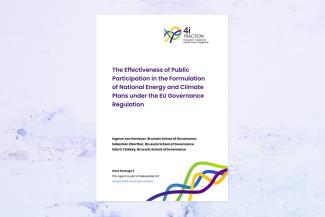
Von Homeyer, I., Oberthür, S., Flekkøy, O.G. (2024): The effectiveness of public participation in the formulation of National Energy and Climate Plans under the EU Governance Regulation. VUB; Brussels.
The Effectiveness of Public Participation in the Formulation of National Energy and Climate Plans under the EU Governance Regulation
This case study investigates the effectiveness of public participation in the drafting and updating of National Energy and Climate Plans across different dimensions.
This report focusses on two procedural policy instruments stipulated by the European Union’s (EU) Regulation on the Governance of the Energy Union and Climate Action (Regulation 2018/1999) (GovReg): the requirement for Member States to regularly prepare and update National Energy and Climate Plans (NECPs) and, more specifically, an obligation to incorporate public participation into the process of drafting of the NECPs and their updates. In this report we investigate the effectiveness of public participation in the drafting and updating of the NECPs across different dimensions.
An assessment of public participation in the formulation of the NECPs can take different forms. A formal assessment could focus on whether EU Member States fully implemented the requirements of the GovReg, while a substantive assessment would need to consider the degree to which public participation has been adequately adapted to its specific multi-level and thematic/policy contexts and has been effective across various goals and dimensions. Assessing public participation in the formulation of the NECPs across three broad “pillars” - robustness, inclusiveness and integration into policymaking - this report adopts a substantive perspective.
According to the GovReg, Member States were obliged to submit NECPs to the European Commission in 2018 (drafts), 2019 (finals) and 2023 (draft updates), including a summary of how the public had been involved in the drafting process. The empirical analysis predominantly relies on a content analysis of the draft, final and draft updated NECPs.
Assessment results
The assessment of the NECPs suggests that public participation has been insufficient, with only limited and uncertain improvements over time. This applies to each of the three overarching pillars of robustness, inclusiveness and integration into policymaking.
Nonetheless some progress has been made with respect to some of the more specific dimensions. With respect to inclusiveness this concerns the diversity of participants (more participation by individual citizens) and of public participation methods as well as, arguably, timeliness of public participation under the integration into policymaking pillar.
However, on several other more specific dimensions no or very little progress has been made. Concerning the robustness pillar, this applies to transparency and independent facilitation of public participation. Regarding inclusiveness, dissemination of information remained particularly weak. Concerning integration into policymaking, the reaction to proposals arising from public participation was predominantly symbolic (“acknowledgement”), rather than substantive (“reasoned”).
Good practice and the way forward
Member States’s public participation performance frequently varied considerably among the three stages. Examples of good performance of a Member State with respect to a particular aspect of public participation are therefore mostly restricted to a particular stage – mainly the 2019/20 final NECPs. Germany performed well on transparency, Belgium on the involvement of individual citizens, dissemination of information, and independent facilitation. The Netherland, Lithuania, and Finland provided exceptional reasoned replies to comments.
Phased public participation, as practiced by, for example, Slovenia on the 2023 draft updated NECP, may allow for progress concerning timeliness problems. An emphasis on public participation by civil society organisations at the early draft stage of the NECPs could be combined with broader online participation by citizens in later policy stages.
To further improve integration into policymaking, a phased approach could be combined with an approach resembling Belgium’s integrated approach which combined public participation on the 2019/20 final NECP, with public participation on Belgian climate and energy policy more generally.